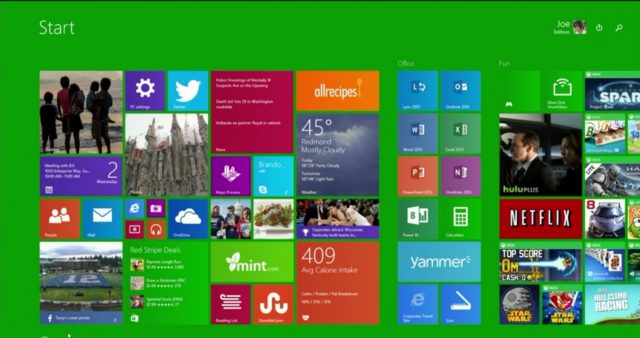
Lenovo ThinkPad 8 -- the Rolls Royce of small Windows tablets [Review]
For many, small tablets are synonymous with low cost. This is thanks to Android tablets like the Nexus 7, which is great. While there is nothing wrong with being inexpensive, many of those Android tablets are also of poor quality -- the market is flooded with no-name variants. This has given small tablets a bad name. Small Windows tablets have been hit or miss. There have been duds such as the Acer Iconia W3 and good ones such as the Lenovo Miix 2 8. What has eluded the market thus far, is a great one.
The ThinkPad name is synonymous with business-class quality and durability. The laptops under this branding are known to be rugged, but elegant too. Leonovo only designates this moniker to computers that meet a certain high standard. So when given the opportunity to review an 8.3 inch ThinkPad tablet, I was excited for a quality product. Is it the great tablet we have been waiting for?

Brendan Eich resigning from Mozilla shows both the good and bad sides of the web
It has been mere days since Brendan Eich stepped down as CEO of Mozilla. It was one of the shortest-lived tenures in history, but it didn’t have to be that way. I’ll spare you the details -- they have spewed across the internet, ad-nauseum. Suffice to say that his views did not meet with that of the technorati at large.
BetaNews was one of the first sites to run the story about a pair of developers boycotting the browser over a perceived difference in ideals. A firestorm ensued, but also a healthy debate. Until now, I have kept quiet throughout this situation. However with the problems now seemingly resolved, and (perhaps or perhaps not) justice done, then it is time to speak my piece.

Windows 8.1 Update will be available on April 8 -- here’s what’s new
Microsoft has just unveiled the Windows 8.1 Update at Build, and it will be rolling it out to users of the tiled operating system on April 8. MSDN subscribers can download it today.
Thanks to leaks, we already knew a lot about it, and even posted our thoughts here previously on BetaNews. I called it a Frankenstein product stitched together with compromises, which it undoubtedly is. My colleague Mark Wilson calls it the final nail in Windows 8.1’s coffin, but Brian Fagioli thinks it’s great. You’ll soon be able to try it out for yourself, but in the meantime here’s what it offers.

Canonical admits failure -- shuttering Ubuntu One cloud services
The cloud business is all the rage nowadays. There are so many companies offering similar services, that it can be hard to choose one. It can also be hard to break into the crowded landscape when big boys such as Microsoft and Google are representing.
So, when Canonical launched Ubuntu One, I was dubious. After all, a small company competing in cloud storage and music sales would be facing an uphill battle. Also, I am sorry to be blunt, but naming a cloud service after an operating system is just plain idiotic. It confuses consumers to think it only works on that operating system. Not to mention, Linux users are very competitive -- Fedora or Arch users would never use anything branded "Ubuntu". And so, today, Canonical announces that it is shuttering its cloud services. Will you shed a tear?

Small companies and big data [Q&A]
It's sometimes said that big data is like teenage sex, everyone talks about it but few are actually doing it. To which you could add that those who are doing it aren't really sure if they’re getting it right.
In an effort to find out how big data is being used in the real world, we spoke to the heads of three startup companies which are employing it in unique ways to pursue specific business opportunities.

5 features of Windows that need defenestrating -- including IE
Defenestrating? Pretentious? Moi?! How could you?!
Don't get me wrong, I love Windows. A fanboy I am not -- I'll quite happily pick holes in Microsoft's operating system -- but for the most part I do love it. While I have a great deal of time for Windows, it doesn’t mean there isn't room for improvement. By this I don’t mean that Microsoft needs to bring back the Start menu or start copying features from OS X or Linux, rather that it's time to have spring cleaning. In just over a week, Windows XP will be consigned to the OS graveyard, but what about Windows 8.1? The latest version of Windows doesn't need to be killed, but there are lots of features that need to be put out of their misery.

Microsoft promises not to read user emails again
After repeatedly bashing Google for going through its user's personal messages in the whole "Don't Get Scroogled by Gmail" campaign, Microsoft went one step beyond automatically scanning messages for keywords in order to serve up adverts, which Google does, and actually read a user’s private email, which Google doesn’t (as far as we know anyway).
Microsoft felt its actions were justified -- it was trying to prove a blogger had leaked pre-release Windows builds -- but users were rightly concerned that Microsoft had shown it was willing and able to read their personal emails should it choose to. The statement the company issued in light of the concern over its practices was hardly reassuring, and suggested Microsoft would do it again should the need arise. Today, Brad Smith, General Counsel & Executive Vice President, Legal & Corporate Affairs, Microsoft, has posted a follow up blog that essentially says Microsoft made a mistake and will be making changes to ensure reading customer emails in this way won't happen again.

Beware of third-party Google-branded Windows Phone apps
The official launch of major Google apps on Windows Phone would qualify as the biggest news of the week, next to the release of Office for iPads. Such an event seems highly unlikely, as the search giant is focusing its mobile development efforts on the more popular platforms, namely Android and iOS.
Imagine my surprise when, only moments earlier, in group chat my colleague Alan Buckingham mentions these five Google apps, that seem legit at first glance: Hangouts, Voice, Maps, Search and Google+. They are now available in the US Windows Phone Store. Did the search giant just have a change of heart? The answer appears to be negative, as, first-off, Google does not sell such apps for $1.99 a pop, it makes them available for free. But, what is so special about them anyway? It is not like these are the only third-party Google apps in Store.

Windows' future is looking increasingly bleak
Analyst Gartner has just released its latest worldwide devices forecast, which shows, unsurprisingly, traditional PC shipments declining, and tablets, mobile phones, and ultramobiles (hybrid and clamshell) all growing. In total, device shipments are set to rise 6.9 percent, up from the 4.8 percent growth achieved last year.
There are few surprises in the report. Shipments of mobile phones, the most popular device type in the market, are expected to reach 1.9 billion units in 2014, a 4.9 percent increase from 2013. The worldwide tablet market is forecast to grow 38.6 percent in 2014, shipments of traditional PCs are forecast to total 276.7 million units in 2014 (a 6.6 percent decline from 2013), and ultramobiles are set to grow from 21.1 million in 2013 to 37.2 million this year. Gartner has also forecast shipments by operating systems, and while Windows still shows growth, overall it's far from happy times ahead for Microsoft.

Microsoft Azure opens its cloud doors in China
After announcing the upcoming rebranding of Windows Azure to Microsoft Azure, the software giant has revealed its cloud platform is now broadly available in China. 21Vianet is responsible for the operation in the local Asian market.
"This significant milestone makes us the first global company to make onshore public cloud services available to customers in China", says Microsoft corporate vice president of Cloud & Enterprise Marketing Takeshi Numoto. Microsoft Azure has been available to local customers since June 6, last year, but only as a public preview.

Why the use of personal data for authentication needs to change
We run more and more of our lives online today, with multiple accounts for different services. But many of those sites rely on the same few personal identifiers.
Things like your date of birth, social security number and mother’s maiden name may be common to many of your logins, and that’s a problem. If one site's security is breached then your personal identifiers are compromised.

HTC is (too) confident reviewers like One (M8)
The first ad a company releases for its new product reveals the marketing strategy it pursues. In HTC's case, the first video advert for the new One (M8) tells us nothing concrete about the smartphone.
The ad features actor Gary Oldman, who, while saying "blah" countless times as if he has got nothing interesting to tell us, refers us to the good old Internet to make up our own minds about the One (M8), a smartphone which, per the man's words, "is designed for people who form their own opinions". No wonder the ad is called "Blah Blah Blah - Go Ahead, Ask The Internet".

Forget the iWatch Apple, it's another race you've lost to Android
Apple has rarely been first to market with a product -- it did not build the first MP3 player or tablet, but it does have a history of revolutionizing those markets, as it did with the smartphone. There isn't anything wrong with stepping into an existing market and bringing along fresh and innovative ideas. In fact, it has worked out quite well for the company over the years.
However, more recent history shows that Apple can also lose the markets, as both tablet and smartphone have fallen behind rival Android, which entered the scene later. Openness plays a part in this -- a multitude of devices to choose from, along with more customizable options, is a big deal when compared to a closed system with one device released annually.

iTunes slaps DRM handcuffs on my music
On Sunday, while perusing my music collection by album, I came across lots of new -- or rather, old and forgotten -- tracks purchased before Apple took iTunes DRM-free. My excitement at discovering, and downloading from the cloud, these long lost songs cannot be understated. That is until finding them not to be what I expected. Rather than crisp, 256kbps DRM-free files, iTunes delivered 128kbps protected-AAC tracks. What the frak? Apple is supposed be done with digital rights management for music.
That iTunes Match provides access to this older music, even if DRM-protected, is a benefit. Thank you, Apple, for providing an affordable means for recovering lost or deleted music. What confuses me: Being given the older, lower-quality, locked files when higher-bitrate DRM-free alternatives are available from Apple's store. I don't have an answer why this morning, but I do have some suspicions. Perhaps you're smarter than me or better at finding solutions in online support forums.

Microsoft: Going through your 'private' emails is like searching 'ourselves'
Microsoft has admitted to going through one of its own users' personal emails (a blogger who has leaked pre-release Windows builds and, allegedly, intended to sell the software giant's IP) without asking for a court order, as this practice is covered by its permissive privacy policy.
To assuage concerns that it may, in the future, not go through its own users' emails without justification, Microsoft has issued a statement which details the steps the company will have to complete, and the obstacles it sets for itself, for such things to happen again. This reminds me of the for-the-sake-of-doing-it surveillance reform that US President Barack Obama unveiled to minimize the controversial NSA mass surveillance practices, that also has similar measures in place to prevent abuse. Neither promise is reassuring.
